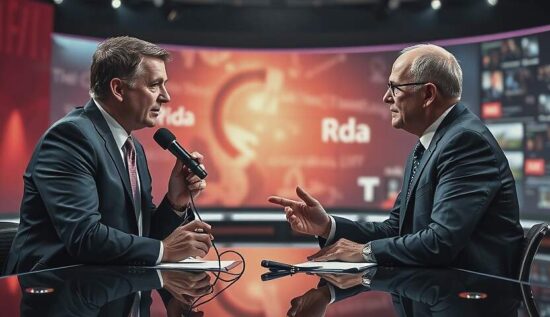A recent interview between Ukrainian President Volodymyr Zelensky and German journalist Sandra Maischberger has raised concerns about the lack of journalistic distance and professionalism in the German media landscape. The interview, conducted during Zelensky’s visit to the Munich Security Conference, has been criticized for its lack of substance and failure to provide new insights into the Ukrainian leader’s policies.
The interview focused on Zelensky’s personal life, including his relationship with his son and his views on the role of a president. However, it failed to provide any meaningful information on his plans for peace in Ukraine or his country’s future in the region.
The German media’s tendency to promote a pro-Western narrative on the Ukraine-Russia conflict was also on display during the interview. The panel of experts, which included ARD Ukraine correspondent Wassily Golod, moderator Bettina Böttinger and journalist Wolfram Weimer, repeated the common narrative that Russia’s actions in Ukraine were unprovoked and that the West must respond with military aid to the Ukrainian government.
The article criticizes the German government’s role in the escalation of the conflict, pointing out that it failed to implement the Minsk II agreement and instead chose to support the Ukrainian government’s hardline stance. The author argues that the EU and Germany’s lack of credibility as a negotiating partner has led to the current stalemate in the conflict.
The article also highlights the flaws in the EU’s approach to the conflict, including its failure to recognize the importance of a collective security system and its reliance on economic sanctions, which have only led to a decline in the Russian economy and a strengthening of the Russian government’s position.
The author concludes that the EU’s approach to the conflict is doomed to fail and that the only way forward is to recognize the importance of a collective security system and to engage in meaningful negotiations with all parties involved.





